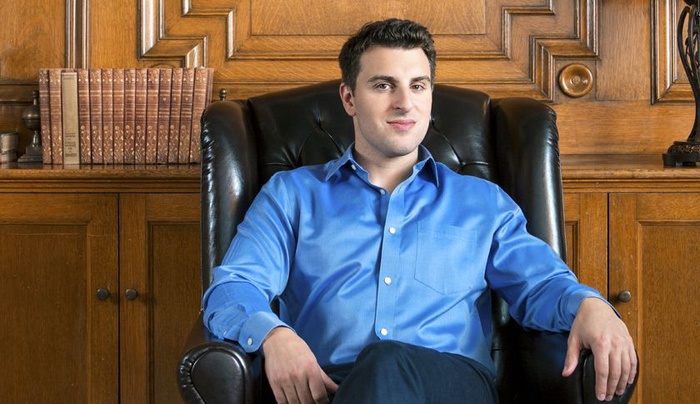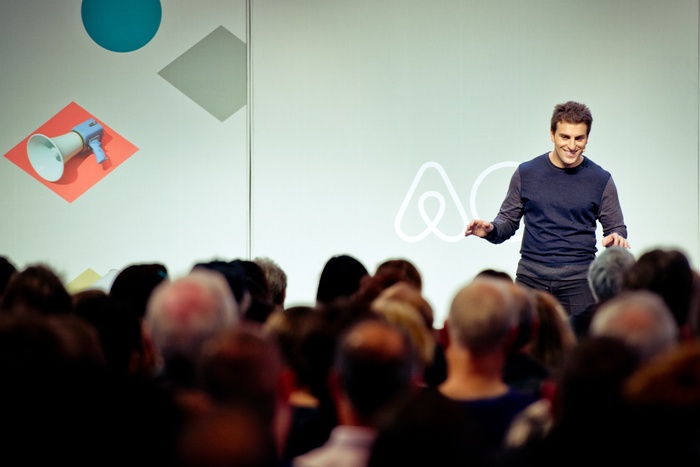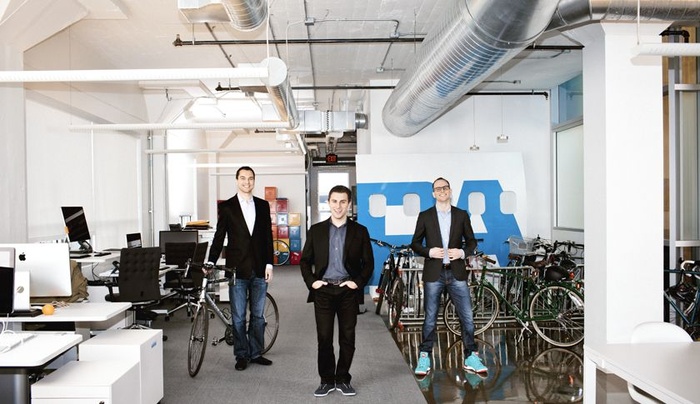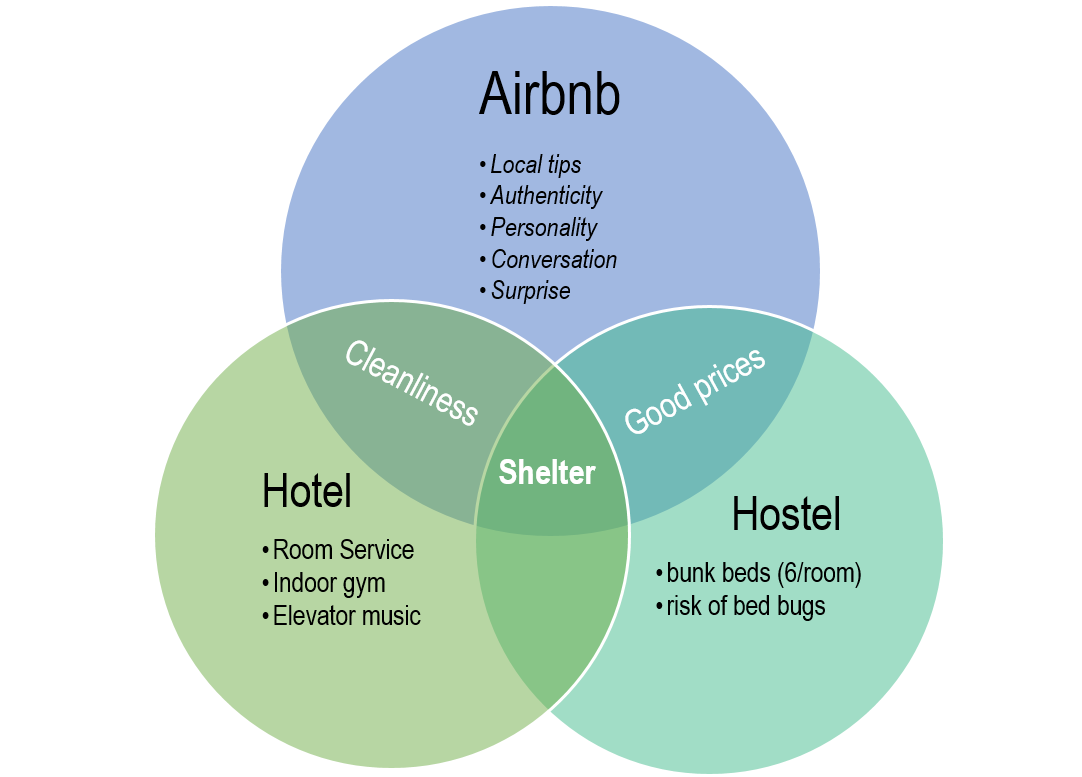Business person: Airbnb founder Brian Chesky, who used mattresses instead of “financial pillows”

The new column “Business Person” tells the readers of “Megamind” about what stories and facts surround the most striking IT entrepreneurs from around the world, the value of companies under their management exceeds any reasonable limits. We will not be limited only to the “new wave” of businessmen and we will also tell about those who are called the “old school”.
Today, life and history of Brian Chesky, the founder of the Airbnb online search and rental center , who has become a multimillionaire thanks to a pair of inflatable mattresses, are life and history.
')
In 2015, Forbes included Chesky in the list of the richest American entrepreneurs under the age of forty. In the same year, he was on the list of the 100 most influential people according to Time magazine.
Childhood, education, hobbies
 Brian was born and raised in Niskayune, New York, in a family of two social workers. Cesky is obsessed with his hobbies since childhood. “He never did anything superficially, even at a very early age,” says his mother, Deb Cesky. Cesky's first hobby was hockey.
Brian was born and raised in Niskayune, New York, in a family of two social workers. Cesky is obsessed with his hobbies since childhood. “He never did anything superficially, even at a very early age,” says his mother, Deb Cesky. Cesky's first hobby was hockey.After once he was presented with a full hockey set for Christmas, he insisted that he would sleep with equipment - shields, skates, a stick and a helmet. Then his love of drawing and design of Nike sneakers grew into a passion for art. He could disappear in local museums for hours, painting reproductions of paintings.
His leadership potential manifested itself in a design school in Rhode Island, where he was the captain of the hockey team. At the graduation ceremony he was chosen to make a speech. Cesky set himself the task, studied all the examples of speeches for the ceremony found; and so as not to be embarrassed, he stepped on the stage the night before and watched the staff arrange 6,000 chairs one after another.
“Who else is capable of this?” Deb Chesky asks.
experience
After graduation, Gebbia, Cesky's friend and classmate, said that he had a hunch that they would open up their business together. “Before you get on a plane, I have to say something to you,” said Gebbia. "One day we will open our company, and they will write a book about it." Cesky first moved to Los Angeles to become an industrial designer, but then decided to join Gebbia in San Francisco.
Looking ahead, we note that Cesky never really had a chance to work in his specialty - he was prepared for a different fate.
Entrepreneurial experience
Starting in any field is always difficult. A start-up entrepreneur also puts his team at risk. But Cesky did not have anything to do but it was easy to plunge into managerial affairs; the company had no time to wait. He began to learn how to do business in practice and from absolute “zero”. Cesky says that he studied in two ways: 1) by trial and error; 2) learned to delve into the subject quickly and narrowly, using a method called "get to the source."
Instead of sitting on every aspect of a particular topic, Cesky discovered that he would be more efficient in spending time searching for one trusted source in this area, and then immediately turn to a knowledgeable person. “By finding the right source, you are moving forward faster,” he says.
The first “sources” of Chesky and his partners were their first financial advisers, technical entrepreneurs like Michael Saybl and Graham from Y Combinator. Cesky used biographies of business characters such as Steve Jobs or Walt Disney as sources. His main book resource for engineering management turned out to be Andy Grove’s book “High-Performance Management”. To learn the basics of hospitality, he went to the Cornell Hospitality Quarterly — a training journal published by the Cornell School at the University of Hotel Management.
As the company became known, the sources of Cesky also became more famous. Soon there were meetings with Mark Zuckerberg from Facebook, Jeff Bezos from Amazon and John Donahoe from eBay. He sought advice from Bob Iger and Mark Benioff to find out how they make their subordinates do more. From Sheryl Sandberg from Facebook, he learned practical advice on how to scale a company internationally.
From communication with former CIA head George Tenet, Cesky learned the importance of the idea of a “walk in the park” and the theory of Walt Disney that you need to be a public manager. Cesky said that Tenet taught him to pay attention to how important it is to send handwritten letters to his employees. The former head of the CIA told him that the most significant moments in his work occurred when he saw that a postcard he had written for an employee many years ago still hangs over his desk. And of course, he was the one who shared the ship theory with Chesky.

Ship Theory
“Airbnb is like a huge ship. And as the CEO, I am the captain of the ship. But actually, I have two positions: first, I have to take care of everything that is below the waterline; about everything that can pull the ship to the bottom. "
“Secondly,” he continues, “I should focus on two or three more areas that are of great interest to me. I do not focus on them because they are below the waterline, but because I can bring something useful and unique to them. They really fascinate me. If things go uphill in these areas, then the company will change for the better. ” He is responsible for three areas: product, brand and culture. “These three things are familiar to me,” he says. “Other areas I trust in to my leaders and try to penetrate them only if there are holes below the waterline.”
Business idea and business partners
In October 2007, Cesky and Joe Gebbia, two unemployed graduates of the Rhode Island School of Design, were stranded and looked at the upcoming date of rent payment. Then they came up with the idea to pull Gebbia air mattresses out of the pantry and sell a sleeping place in their apartment at the height of the popular exhibition of designers. They called the Air Bed and Breakfast hut (“Inflatable Bed and Breakfast”). "Continental breakfast" consisted of frozen pop-tarts. On the same weekend, three people stayed overnight. The idea was to draw attention to design blogs.
A few months later, their friend, developer Nathan Blecharzik, joined Cesky and Gebbia as the third co-founder, and in August 2008 a site called Airbedandbreakbreak.com was released. It has become an online platform for people who rent a berth in their home. Cesky naturally aspired to the role of leader, since Gebbia occupied design, and Blecharzik - technology.

Many experts and luminaries of Silicon Valley were initially extremely skeptical about the concept of Airbnb. But the idea became widespread, and the following spring, the founders accepted the prestigious start-up incubator Y Combinator, which was opened by venture capitalist Paul Graham.
Then they shortened the name to Airbnb and expanded it, offering not only a place, but also separate housing, including houses and apartments, castles, boats, tree houses. In November 2010, the trio received their first round of venture capital investments. Today, Airbnb has roughly 2,000 hired workers from 21 offices around the world, offering its services in 34,000 cities.
Crisis period
The most important leadership lesson Cesky learned when the company overcame its biggest crisis. He came in June 2011, when the rented house in San Francisco was hacked and ransacked tenants. The hostess did not recognize in the blog the fact that the company did everything in its power. While the Airbnb lay on the bottom, there was a buzz around the story.
Inside Airbnb, everyone had different opinions on how to deal with the problem. “I had a difficult period, and I came to the fact that I can’t just take it and stop worrying about certain things, then my priorities completely changed,” says Chesky. "Basically, I told myself that I needed to stop caring about the consequences and think about the root cause." He wanted to apologize, even if it hurt the company.
Cesky compiled a letter written in harsh terms, assuming responsibility. “Over the past four weeks we have broken wood,” he wrote. He not only apologized, but also said that the company would provide $ 50,000 insurance. “All this is contrary to the advice of others,” said Cesky. - People around said that they need to thoroughly discuss the problem, check everything inside and out, and I said, "No, we do, like this." In times of crisis, we have to take one direction: either to the right or to the left. ”

Sharing economy
The Airbnb team pioneered the provision of services for sharing, and Český itself became one of the main ideologists of the sharing economy (or “shared economy”). Since it was founded in 2008, a startup has gone from a simple site without searching, booking, reviews, or the ability to pay online to an effective platform for providing rental services in 192 countries. Now Airbnb is a company with a capitalization of more than $ 25 billion.
The essence of a shared economy is that the owners of material resources turn to online sites in order to capitalize the unused portion of their property, and consumers rather rent what they need from individuals than buy or rent from companies.
Dozens of startups using this trend will go bust, because for sites of this kind the “winner takes all” rule applies. And the winners will have to defend their interests in the fight against regulators. So, Airbnb has been fighting for several years to legalize its activities in New York and San Francisco.
Source: https://habr.com/ru/post/298968/
All Articles